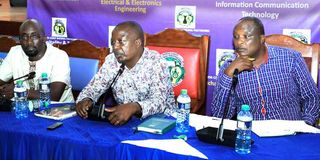Premium
State official, Knec approved of suspect exam results, MPs told

National Assembly Education committee chairman Julius Melly (centre) with Marakwet West MP Timothy Kipchumba (left) and Igembe North MP Julius Taitumu in Mombasa on March 23, 2023.
MPs probing irregularities in the 2022 Kenya Certificate of Secondary Education (KCSE) examination were yesterday told different ways used by cheats to beat the system.
The National Assembly Committee on Education, which had its last public hearings yesterday, met with the Kenya Union of Post-Primary Education Teachers (Kuppet) and Nairobi County examination officials, who tabled reports on the alleged mass cheating in last year’s exam.
A report tabled by Kuppet secretary general Akelo Misori revealed a skewed distribution of performance, irregular jumps in the mean scores of some schools and testimonies by examiners. Of the 881,416 candidates who sat the exam, those who scored D+ and above were 522,558, compared to 442,251 in 2021. Those who scored D- were 359,828, compared to 384,556 in 2021.
“Statistically, the performance of the 2022 KCSE exam was a skewed distribution, where few students had exemplary performance, while a large group of students performed poorly,” Mr Misori told the legislators.
Irregular jumps in mean scores were also tabled before the committee.
Of the schools sampled in the report, St Thomas Moore Riangómbe had a mean of 3.7 in 2021 and 7.1 in the 2022 KCSE, Rigoro ELCK had 5.7 in 2021 and 9.0 in 2022, St Paul’s Igonga had 5.89 in 2021 and 10.2 in 2022, and Mobamba High School had 6.2 in 2021 and 9.28 in 2022.
Mr Misori questioned how the schools could record such a big improvement. “Normally, schools improve by an average mean score of 1.0, but in cases that require scientific investigation, some schools improve by 5.0.”
Due to the skewed distribution of performance, Mr Misori told the MPs that the 2022 KCSE examination had not realised its intended outcome.
“These results show that the outcomes of the teaching process were varied, but the intended outcome of the national examination may not have been realised. The number of students at both extremes is expected to be almost equal, say 8,000 A plains and 8,000 Es, for the test to present a normal curve, as opposed to the skewed distribution we are experiencing,” he added.
Cheating cases
In Nairobi County, a report tabled indicated that most exam irregularities were reported in private schools and private centres.
They ranged from the use of mobile phones in the examination rooms, possession of unauthorised materials, suspect impersonation, to mismatch of candidates’ identification documents. Mobile phones were seized at Starehe Private Centre, Makadara Private Centre and Embakasi Private Centre.
At Asilaam Academy in Lang’ata, eight out of nine students who sat the computer studies theory paper were found with mobile phones.
At Light Academy in Dagoretti, the report before MPs showed a teacher was arrested in the first week of the examination while sneaking in answers during a mid-morning paper. He was sent by the school director, who was later found possessing all examination papers on his mobile device.
A regional director of education, Margaret Lesuuda, said they received a directive from a senior official in the government to ignore irregularities. “We were told: ‘this is a year of elections, and we do not want an outcry.’ We were told not to cancel any examination results for any school found having irregularities,” she told the MPs.
Testimonies before the MPs by examiners also revealed the strict conditions under which they worked.
“Some of the examiners reported cases of obvious collusion to both Knec and the Ministry of Education officials but were told that their business was just to mark but not to spoil the good name of Knec,” one teacher said in the report tabled by Mr Misori.
It also emerged that most markers did not report examination irregularities to the Kenya National Examinations Council (Knec) for fear of reprisal.
“Some teachers were unfairly interdicted because Knec reported them to the Teachers Service Commission over exam-related issues. If Knec reported no cheating, why are some teachers being interdicted?” Mr Misori asked.
A teacher, in written testimony, said some principals colluded with security officers, supervisors, invigilators and education officers and paid them to look the other way.
“Exam papers are brought to school in the morning. They are opened, and then a copy is taken to subject teachers and hired university students stationed somewhere within the school compound with a photocopier machine to divide the questions and do them. The answers are photocopied and taken to the class for the learners to copy after 20 minutes,” the testimony reads.
Mandera South MP Abdul Haro raised concerns about the future of the country. “We know examinations are the soul of this nation and the bedrock of whatever we do. We are talking about the future of our children and country. What happens to the future generation when we have children who are taught to cheat early in their life?”
Committee chairperson Julius Melly said there is a need to avoid making national examinations a matter of life and death.
“Our national examination is typed and packed in London and leaks, yet the term-end exams the students do are typed within the school but do not leak. As a nation, it is time we looked at how to reduce the high stakes of the national examination. It is becoming a matter of survival; this is why we are experiencing this.”
Mr Melly said they would summon Education Cabinet Secretary Ezekiel Machogu and Knec officials to explain the instances of exam cheating.




